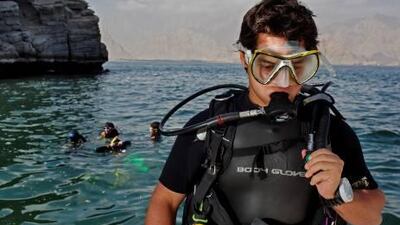DUBAI // When the mercury goes up, one group of sports enthusiasts heads in the other direction.
For many scuba divers, summer is the perfect time to sign up for training and brush up their skills.
"Summer is our peak period," says Ernst van der Poll, a diving instructor at Pavilion Dive Centre in Dubai.
"We tend to do very well because diving is one of the few outdoor activities you can do here. Our boats are usually fully booked during the summer and sometimes we work seven days a week."
Although there has been a small dip in numbers at the Al Mahara Diving Centre in Abu Dhabi, most divers are still keen in the summer months, says Kathleen Russell, the manager and course director at the centre.
"We continue to dive throughout the summer as a way to beat the heat," Mrs Russell says. "Anything is better than the 45°C heat."
The summer temperature of local waters is in the 30s, she says, meaning divers do not have to wear wetsuits. The sea is also usually calmer at this time, which makes trips - usually between 45 minutes and an hour - more comfortable and easier, Mr van der Poll says.
Once out of the water, divers have the sea breeze to make the heat more bearable.
"At sea it is a lot cooler because you get a constant breeze," he says.
But divers are still at a higher risk of dehydration, and Mrs Russell and Mr van der Poll stress they must drink a lot of water during the day.
Both dive centres organise trips to the east coast and the Musandam Peninsula, where the abundance of algae in the summer attracts whale sharks, the world's largest fish.
For some divers, summer is the time to improve qualifications. There are several international bodies that qualify divers, with the Professional Association of Diving Instructors (Padi) and the British Sub Aqua Club the two most popular systems worldwide.
In both, divers usually start by receiving a beginner's licence. Then they progress through a variety of courses designed to enable them to dive deeper or train other divers.
Benjamin Forde, based in Dubai, is upgrading his qualifications by taking the Padi rescue diving course, which teaches skills such as emergency first response.
Mr Forde, 43, is also an experienced skydiver and the creative director of Skydive Dubai, which caters to novices and enthusiasts. The two sports have a lot in common, he says.
"They are both very similar in the procedures, caring for your equipment, trusting your ability," Mr Forde says. "One is faster than the other, that is it."
His description of scuba diving is different to that of his teacher, Joichi Ito.
Mr Ito, 45, is a prominent technology entrepreneur and internet freedom advocate.
He spends an average of one week a month in Dubai, dividing the rest of his time between Japan, Singapore and the US.
A year ago he took intensive scuba training and now teaches up to four students a month.
"It is my relaxation," Mr Ito says.
Scuba diving has also become his version of golf, where he invites work associates and business partners.
"You really build the trust," says Mr Ito, who is also the director of the MIT Media Lab, an innovation centre at the Massachusetts Institute of Technology.
"You also learn a lot about a person - how calm they are, if they care for nature, how co-operative they are."
Last week, we rode with people who enjoy dune bashing. In the final feature of the series, next week, we look at people who sail through summer.

